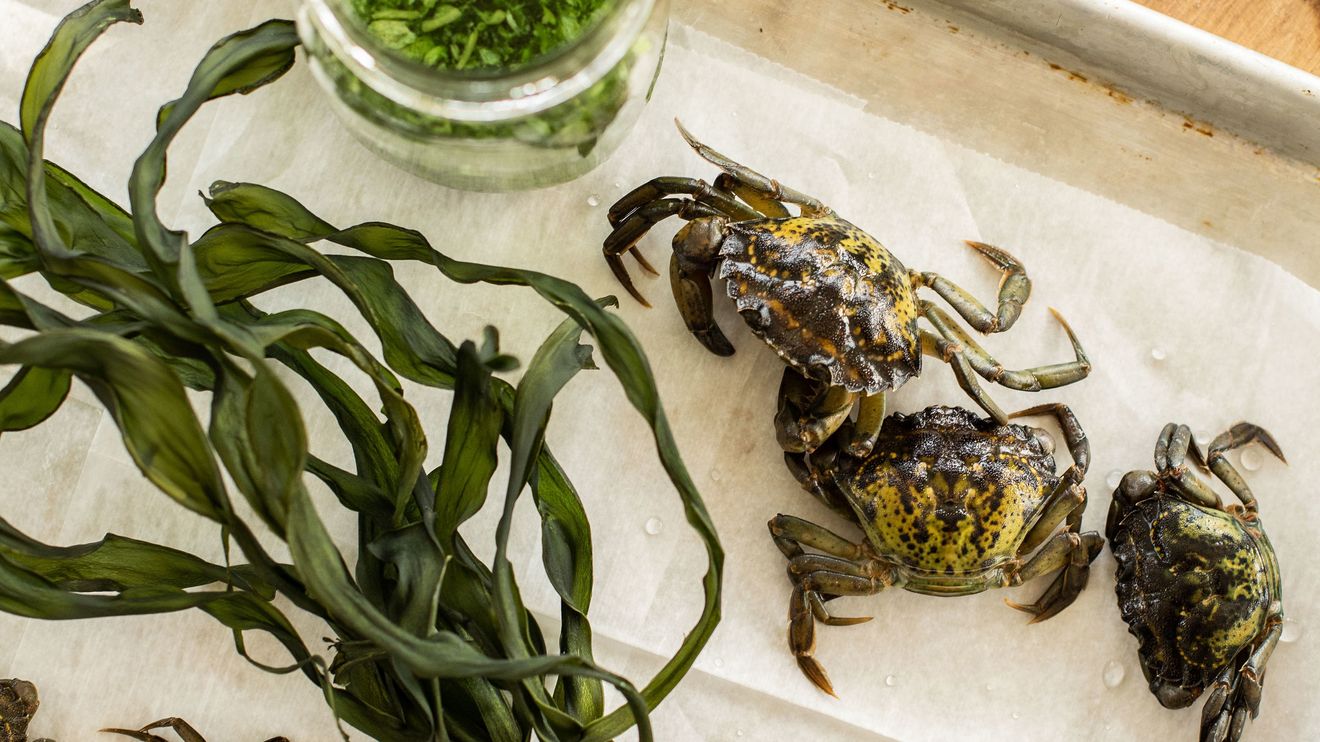A little crustacean-flavored bourbon, anyone?
It may sound like a crazed distiller’s idea of a joke — remember the SNL skit about wacky hard seltzers? — but it’s an actual thing. Specifically, it’s Crab Trapper, a green crab-flavored whiskey from New Hampshire’s adventuresome Tamworth Distilling.
And guess what? It actually delivers on its crabby promise in tasty fashion.
I had the whiskey last week when I was on vacation in the Granite State and visited the distillery in its namesake town — a picture-perfect community sandwiched between mountain and lakeside locales. I had known about Tamworth from previously sampling its venison-flavored whiskey, aptly called Deerslayer, but when an employee showed me the Crab Trapper, I had to do a double take. Or to quote my reaction: “You’ve got to be (bleeping) kidding.”
But I soon took my sample glass down to the distillery’s riverbank area and discovered the odd pleasures of crustacean-flavored bourbon. You definitely get a mouthful of crab here — Tamworth says its recipe calls for creating a shellfish stock and then blending that with its bourbon. The crab flavor is, however, smartly balanced by the sweetness of the whiskey. There’s also a lingering note of savory spice, reminiscent of the classic Old Bay seasoning.
In all, it’s like having a messy ol’ dinner of Maryland-style crabs, but in not-so-messy liquid form. Except in Maryland, you’ll find blue crabs, whereas the Tamworth whiskey is made with green crabs, an invasive species that has become a problem along the New England coast.
Unlike their blue-colored brethren, green crabs don’t yield a lot of meat, so there’s no real market for them — at least as a main course — and thus no way to keep the population in check. Which is why some smart folks, including a dedicated team at the University of New Hampshire that worked with Tamworth, are looking for other edible uses. Why not a whiskey?
All this makes for one heckuva story. So it’s perhaps no surprise that the green-crab whiskey has become a viral sensation, covered in outlets ranging from Food & Wine to CBS News. I get it: There’s a shock factor here that’s hard to ignore.

Tamworth offered Crab Trapper as a limited-edition item, but distiller Matt Power expects the company will start producing more.
Tamworth Distilling
Still, it’s important to bring a bit of context to the crustacean-flavored bourbon. For starters, it’s not quite as new an idea as you might think, say those in the booze world. “Mezcal has been doing it for years,” says Jared Bailey, a spirits expert who’s general manager of New York’s Soho Cigar Bar. Bailey is referring to pechuga, a style of the Mexican spirit that can be flavored with chicken, duck or maybe even a wild rabbit. (I tried a version some years ago.)
Moreover, there’s been a fair bit of experimentation in the spirits industry in recent years. Think of Scotch finished in specialty casks (or, for that matter, tequila finished in Scotch casks). Or think of orange-flavored Irish whiskey. The reason why so many distillers are going this route? In part, they’re simply taking a cue from the food world, which has embraced new and unusual flavors. (How about a spoonful of everything bagel-flavored ice cream?)
Distillers are also mindful of the competitive landscape — meaning they know there’s a lot of fighting for space on liquor-store shelves. In the Scotch category alone, we’ve gone from a small number of popular blended whiskies — basically, Johnnie Walker, Dewar’s and a couple of others — to a showroom of single malts. So, innovation becomes almost a means of survival. “It takes a lot to be able to stand out from the crowd,” says Noah Rothbaum, author of a number of books on spirits and an executive with Flaviar, an online membership club for spirits lovers.
There’s a risk with innovation, of course. I mean, as much as I liked Tamworth’s crab-flavored whiskey, I didn’t think much of its venison-flavored booze. (The main issue? I just didn’t taste the meat.) And there are some products out there that strike me as commercial crapola. (Generally speaking, I’m wary of any whiskey that’s seemingly designed to taste like a Jolly Rancher candy.)
It’s a point echoed by Mark Emil Hermansen, the chief executive officer of Empirical, a cutting-edge spirits brand that specializes in what some call free-form booze — that is, spirits that don’t fit into any defined category (like whiskey, gin, vodka, etc.). As much as Empirical pushes the envelope — it recently released SOKA, a spirit made from sorghum-cane juice — it also hews to a hard-and-fast rule, Hermansen says. “If it’s not delicious, it’s not going anywhere,” he declares.
Which brings us back to Crab Trapper. Matt Power, a distiller at Tamworth, says the sudden fuss over the whiskey has caught him by surprise. Originally, the spirit was to be a limited-edition offering, but now he suspects otherwise. “My hunch is we’re going to be making a lot more than we expected,” he says.
